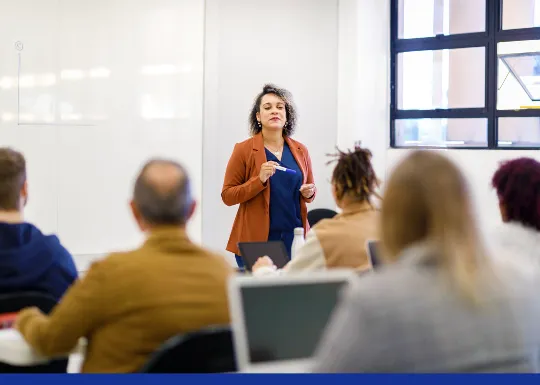


Learn about the COIL Methodology
This initiative aims to enhance students' global, technological, and practical training, preparing them to lead in environments characterized by innovation, digital transformation, and intercultural collaboration.
All activities are designed and coordinated directly by CIRT, in close collaboration with Carver University’s Chair Programs, strategically integrating the international component into the academic training process.
Bachelor’s and master’s Programs at Carver University: Foundations for International Collaboration
Carver University offers Bachelor’s and master’s programs designed to educate leading professionals in strategic fields such as technology, psychology, public management, and administration.
These programs combine a strong academic foundation with an international outlook, making them suitable for integration into collaborative academic activities such as mirror classes under the COIL (Collaborative Online International Learning) methodology.
The subjects of each program allow the development of international learning experiences that strengthen technical, intercultural and innovation competencies.
Bachelor’s Programs
Bachelor of Science in Computer Engineering
Computer Engineering, Intelligent Systems, Cybersecurity, and Technological Development.
Key Areas for Mirror Classes:
• Intelligent Systems and AI Algorithms: Comparative analysis of applications in diverse cultural contexts.
• Cybersecurity: Design of data protection policies and incident management in international settings.
• Technological Development: Collaborative digital innovation projects.
Bachelor of Science in Psychology
Applied Neurosciences, Digital Psychology, Human Behavior in Virtual Environments.
Key Areas for Mirror Classes:
• Digital Psychology and Online Beh * avior: Intercultural analysis of behavior on social networks and virtual platforms.
• Applied Neuroscience: Comparative studies on the impact of technology on psychological well-being.
• Intervention in Virtual Environments: Design of psychological support strategies in global contexts.
Master’s Programs
Master of Business Administration
Strategic Leadership, Technological Innovation, Digital Transformation Management.
Key Areas for Mirror Classes:
• Leadership in Global Digital Contexts: Analysis of international business cases.
• Technological Innovation and Entrepreneurship: Business plan design adapted to various cultural realities.
• Organizational Digital Transformation: Change management strategies in globalized environments.
Master of Arts in Psychology
Applied Psychology for Well-being, Neuroscience and Behavior, Psychological Intervention.
Key Areas for Mirror Classes:
• Positive Psychology and Well-being in Virtual Environments: Intervention studies across cultures.
• Impact of Technology on Mental Health: Collaborative research on digital platform usage and emotional well-being.
• Educational and Organizational Intervention Strategies: Adaptation of programs to international contexts.
Master of Arts in Public Administration
Digital Governance, Public Innovation, Public Policies.
Key Areas for Mirror Classes:
• Analysis of Smart Public Policies: Comparison of open data and smart city programs.
• Innovative Public Management: Co-design of administrative modernization projects.
• Evidence-Based Decision-Making: Case studies applied to diverse governmental realities.
What Are International Mirror Classes (COIL)?
Format
Methodology
- Each activity features two professors (one from Carver and one from the partner institution).
- Each session begins with brief 20-minute presentations by each professor on the selected topic.
- Critical discussion.
- Practical case resolution.
- Joint proposal design.
- Recommended Number of Participants: Maximum of 40 students per session (20 from Carver and 20 from the foreign university).
- Experience Documentation: Each activity generates evidence to document and disseminate the experience:
- Institutional press release.
- Graphic or audiovisual recording of the session.
- Satisfaction survey for faculty and students.
- Joint participation certificate.
Expected Learning Outcomes
- Critically analyze technological and social challenges in international contexts.
- Design innovative and sustainable solutions integrating technical, ethical, and management aspects.
- Demonstrate intercultural and interdisciplinary collaboration skills by working effectively in diverse teams.
Do you want to be part of CRIT?
Send us your contact information to keep you informed of the actions of the Carver University Center for Research, Innovation and Technology.


 .
.